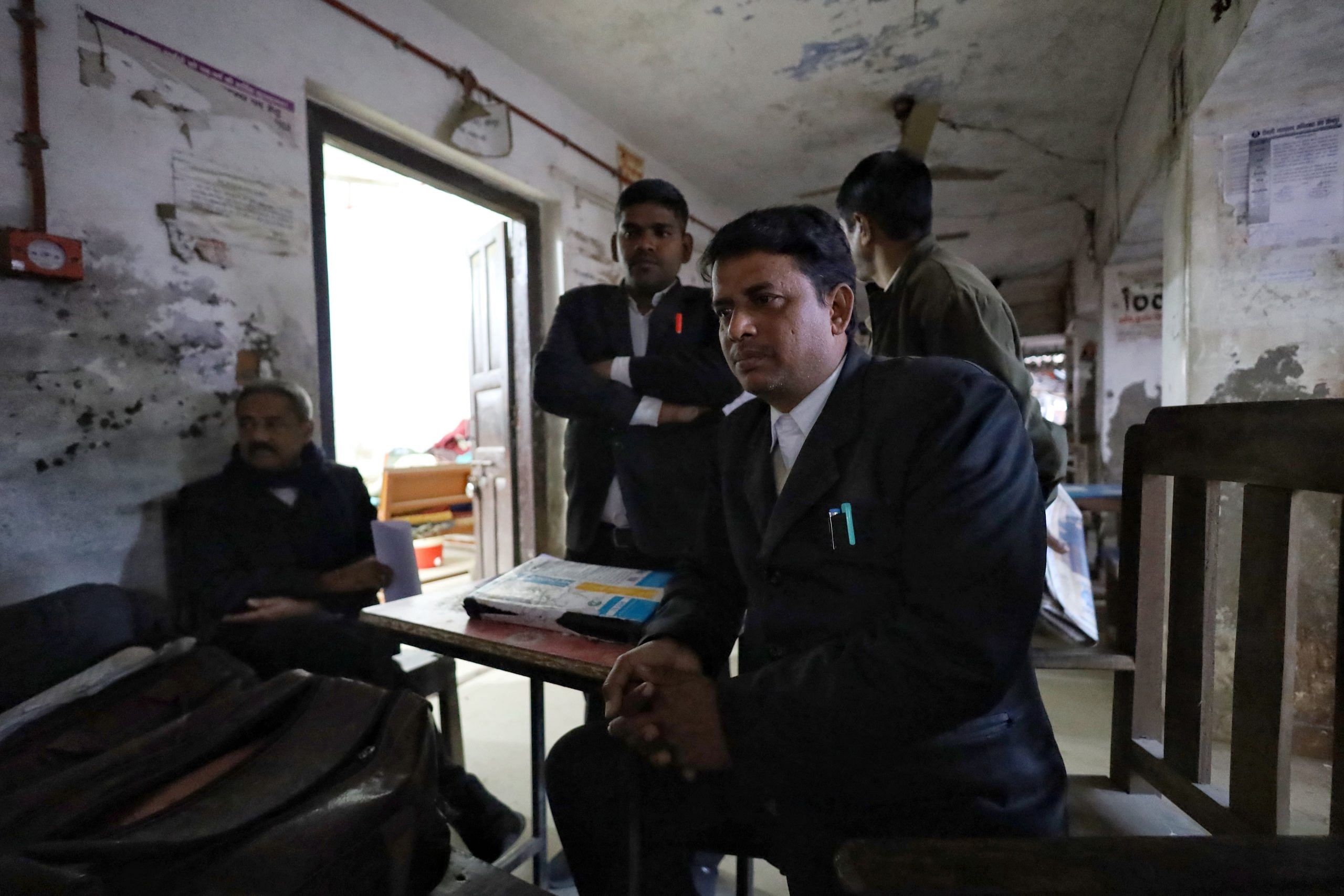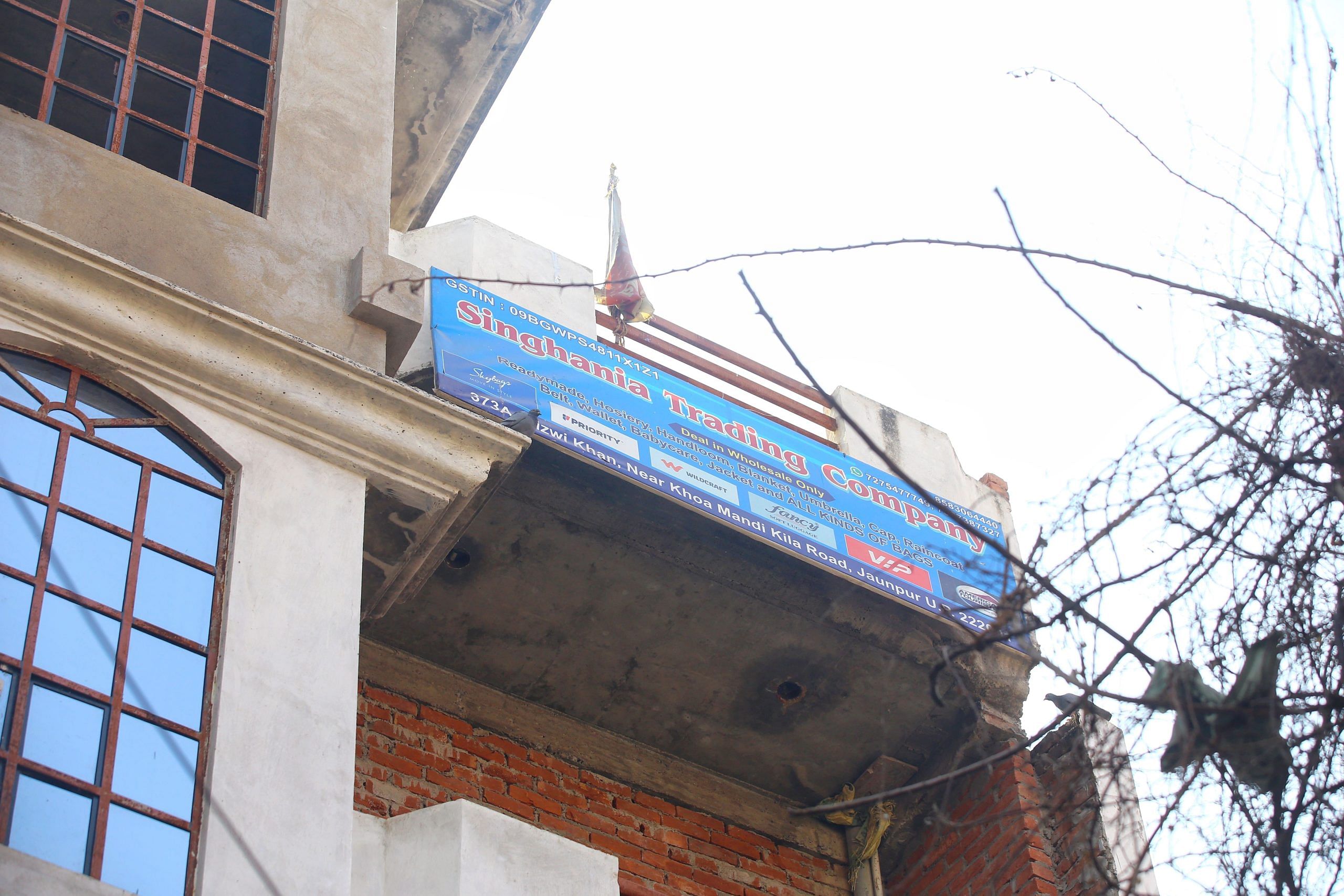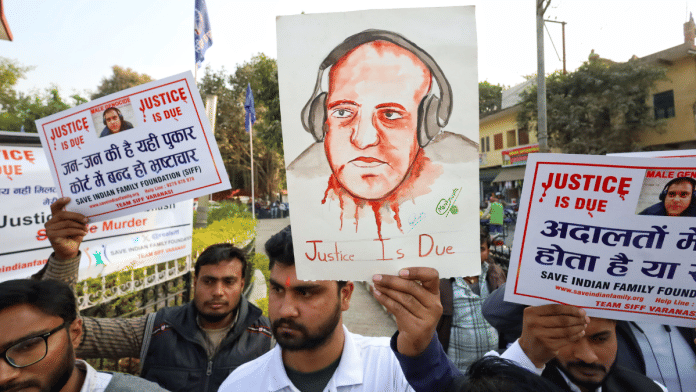Jaunpur, Uttar Pradesh: The WhatsApp message was short and cryptic: ‘Be safe and prosper.’ The time stamp showed 1.55 a.m.
Alerted by a call from his colleague Avdhesh Tiwari on 9 December, advocate Shailesh Kumar Sharma found a flurry of “unclear” messages, including the one above, in Hindi and English from Bengaluru techie Atul Subhash on his mobile phone. The day had barely begun as it was about 8 a.m.
Sensing something was amiss, the advocate dialled Atul’s number but there was no response. Hours later, Sharma received a call from Atul’s teary father, who broke the news that the 34-year-old was found dead at his Bengaluru home leaving behind a suicide note in which he gave details of his personal and legal battle with his estranged wife Nikita Singhania.
Based on a complaint from Atul’s brother, the Bengaluru City Police booked Nikita, mother-in-law Nisha, brother-in-law Anurag and his wife’s uncle Sushil Singhania. Barring Sushil, the remaining three were arrested Saturday from Gurugram and Prayagraj. All of them were sent to 14-day judicial custody by a court on Sunday.
Both Sharma and Tiwari had worked on Atul’s marital dispute case together in Jaunpur, the hometown of his estranged wife. Tiwari, too, had received the message from Atul on that fateful night.
ThePrint spoke to Atul’s lawyers regarding how the marriage had descended into a lengthy legal battle, one which had seen several petitions filed by his estranged wife against him.
Marriage doomed from the outset?
According to the court records, Nikita, daughter of an affluent Marwari family, and Atul Subhas Modi from Bihar’s Samastipur tied the knot at a grand venue on 26 April 2019 after matchmaking through a matrimonial site, Shaadi.com.
Two days later, she reached her in-laws house in Samastipur for the first and only time and then left for Bengaluru with her husband on 30 April.
Nearly three years after the marriage, she filed a petition the chief judicial magistrate (CJM) at her hometown in Jaunpur, seeking a criminal case against Atul and his family over allegations of cruelty among others and provisions of the The Dowry Prohibition Act.
Simultaneously, she had filed police complaint against Atul and his family, alleging their harassment led to her father’s heart attack in August 2019, and sought criminal cases under The Dowry Prohibition Act, and under Section 302 (murder) of the Indian Penal Code (IPC) blaming them for the death of her father.
Before the court decided the matter, the Jaunpur Police had on 22 April 2022 booked Atul, his parents and brother under Sections 498-A (matrimonial cruelty), 504 (intentional insult), 506 (criminal intimidation), 323 (assault) of the IPC and Sections 3 and 4 of the anti-dowry law.
While the first criminal proceedings related to the marital dispute began with the First Information Report (FIR) in April 2022, Nikita had already moved an application for maintenance on 19 January 2022 under Section 125 of the Code of Criminal Procedure (CrPC) that empowered magistrates to order monthly allowance for the maintenance of a wife, child, or parent who cannot support themselves due to physical or mental incapacity.
In the FIR filed by Jaunpur Police, a copy of which ThePrint has seen, Nikita alleged that her in-laws were happy with the gifts her family had sent for her and for them and that they began demanding a dowry of Rs 10 lakh right after the marriage.
“My husband started to beat me up after being drunk and started treating the husband-wife relationship with savagery. He used to transfer my entire salary from my account to his by threatening me,” Nikita alleged in her police complaint.
She further alleged that Atul’s parents came to her house in Jaunpur on 16 August 2019 and demanded Rs 10 lakh dowry or else there would be a divorce, which came as a fatal shock to her father.
However, she added that after her family convinced her of things getting better following which she returned to Bengaluru to live with her husband and gave birth to their only child in February 2020.-

While the dates of the events made by Atul and Nikita—about the marriage, birth of their child, Nikita’s travel to and from Atul’s home in Samastipur, and her departure from his Bengaluru house—are largely uncontested in their disclosures before the court, the underlying reasons behind the legal moves made by either of them are very different.
Before the Jaunpur family court, Atul alleged that Nikita continued to abuse his mother when she was in Bengaluru to take care of her during pregnancy. “Her mother used to incite her to misbehave with my family,” Atul had argued during the hearing which formed part of the judgement.
The techie alleged that Nikita forced and pressured him to book tickets for herself, her mother and brother and left with valuables on 17 May 2021. She allegedly returned on 25 September that year. He further alleged that she returned with her friend and family and misbehaved with his mother in his absence and left home for the final time two days later. The couple had been living separately since then, with the child staying with Nikita.
Nikita claimed Atul abused her after her return in September 2021 and again demanded Rs 10 lakh in dowry. She alleged that running out of options, her mother approached police who registered a Non-Cognizable Report (NCR), paving the way for her to receive her valuables before leaving for the final time.
NCRs are registered in case of non-cognisable offence and investigators cannot investigate or arrest accused in these cases without court’s permission.
‘Extraordinary’ ruling
While the criminal case registered by the Jaunpur Police and the maintenance suit filed by Nikita are the two major cases involving the estranged couple, there were several petitions filed by her, right from the Jaunpur district court to the Allahabad High Court.
Nikita had first moved the maintenance suit on 19 January, 2022 seeking Rs 2 lakh per month for her and son’s maintenance. She had simultaneously requested principal family judge Rita Kaushik to allow a maintenance of Rs 50,000 per month.
While the judge had on 2 July 2022 ordered an interim maintenance of Rs 20,000 per month, Nikita moved the Allahabad HC in 2023 seeking directions to the family court to expedite the matter. According to the court records, the HC on 24 August that year ordered the family court to dispose of the case within six months.
On 29 July this year, judge Kaushik ordered Atul to provide Rs 40,000 per month to Nikita for the maintenance of their son but the application for her maintenance was declined on the grounds of her income and employment.
A MBA degree holder, Nikita is employed with a global giant in Delhi. She had allegedly hidden her income and employment status before the court while seeking monthly maintenance of Rs 2 lakh per month, according to Atul’s lawyers.
“However, when we raised the issue, the judge asked her to furnish every detail in line with the landmark judgement passed by the Supreme Court in the Rajnesh vs Neha 2020 case that issued comprehensive guidelines on the procedure to streamline grant of maintenance,” advocate Shailesh Sharma told ThePrint.
On the court’s order, Nikita submitted that her monthly income was around Rs 78,000 per month, while Atul mentioned a monthly income around Rs 2 lakh and annual package of Rs 40 lakh.
Lawyers involved in marital dispute cases at Jaunpur district court told ThePrint that the interim ruling granting Rs 20,000 per month to Nikita was somewhat “extraordinary”.
“Giving Rs 40,000 per month in the final order is fine, because by then the judge goes through the merit of the case and income status of both husband and wife. In this case, Rs 20,000 was granted in interim even before the matter was heard in full. This must be the highest monthly maintenance granted in an interim order passed by the Jaunpur civil court,” advocate Radheshyam Yadav told ThePrint.
“Monthly maintenance of Rs 5,000 to Rs 6,000 is an average maintenance grant granted here. This is an extraordinary ruling,” advocate Mahendra Nath Dubey explained.
Nikita’s Jaunpur lawyer Vinod Srivastava refused to comment about the details of the case filed by his client in the family court seeking maintenance.
In his 24-page suicide note, Atul accused judge Kaushik of demanding Rs 5 lakh to facilitate meditation which he refused. The techie further alleged that when he mentioned the National Crime Records Bureau (NCRB) data on suicides due to false cases during hearing in March, Nikita scornfully asked him why he does not take that step.
The next month his mother-in-law smirked, according to the note, and asked why he did not end his life after talking about it in the last hearing.
Also Read: Tarpaulin sheets hide masjid rubble, expose Fatehpur tension. It’s ‘hurried action’ vs ‘development’
How the cases panned out
While the HC asked the family court to dispose of the matter within six months of receipt through an order dated 24 August 2023, it had on 12 January this year ordered the Jaunpur CJM to conclude the trial in criminal proceedings against Atul in one year.
Before the HC gave its order in the maintenance case, there were 18 hearings from February 2022 to July last year. After the HC’s direction, 40 hearings were scheduled in a nearly one-year period ending 29 July when a maintenance amount of Rs 40,000 per month was fixed.

On 30 August 2022, the Jaunpur Police filed a chargesheet against Atul and his family seeking their prosecution under IPC and the Dowry Prevention Act. But, the charges are yet to be framed as none of the accused appeared before the court.
Atul’s parents and brothers were granted bail on 26 October last year, while a warrant was issued against him on 24 November. Atul surrendered on 6 February this year and secured interim bail before getting regular bail on 10 May. He did not appear in court on six occasions this year and ended his life two days before the last date of hearing on 12 December.
‘Alienation with son’
Advocate Advocate Dinesh Mishra and his associates said that while a lot is being talked about the ‘high maintenance’ amount, the techie seemed most concerned and heartbroken about his inability to meet his four-year-old son and his wife’s refusal to allow him to do so.
In nearly all hearings, Atul appealed to the judge to allow him to have video calls with his son regularly and requested a formal order binding on his wife to ensure she facilitates communication. “All those pleadings fell on deaf ears. The judge never addressed that concern…despite his agreement to pay interim maintenance, he was constantly denied the opportunity to talk to his son,” a lawyer told ThePrint.
The techie from Bihar was asked to move by judge Kaushik to a different court governed by child custody laws, according to his lawyers. But they argued that those remedies would have been applicable only if the son had attained seven years.
“Not meeting his son was his biggest disappointment that came out during judicial proceedings,” another lawyer, who dealt with his maintenance case, told ThePrint.
(Edited by Tony Rai)
Also Read: Allahabad HC’s sweeping order in dowry case shows why women don’t get justice against cruelty







Gender relations, alimony, culture everything is discussed for this case. There is a resounding silence about the judge’s bribe. The judge requested a bribe. No one talks about it. They have exposed identities of tge woman her relatives. Talked about consequences with her employment. Is the judge even suspended pending investigation? Is she handling more cases?
Everyone has made a business out of these divorce battles. Maintenance or any kind of money should be squarely zero. We are a nation that follows and breathes Atmanirbharta. Zero dowry, zero alimony, equal contribution towards the child.